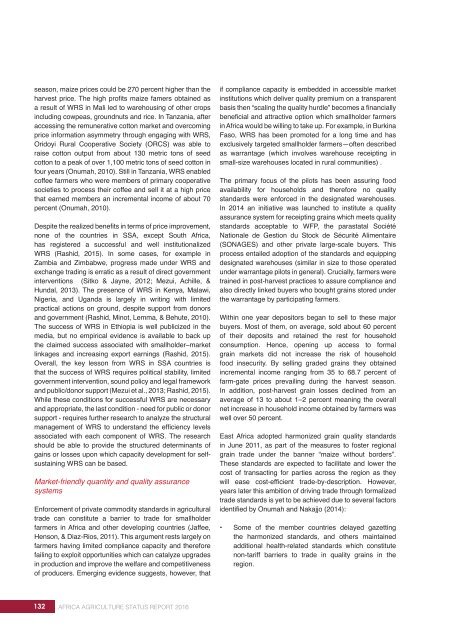AFRICA AGRICULTURE STATUS REPORT 2016
AASR-report_2016-1
AASR-report_2016-1
You also want an ePaper? Increase the reach of your titles
YUMPU automatically turns print PDFs into web optimized ePapers that Google loves.
season, maize prices could be 270 percent higher than the<br />
harvest price. The high profits maize famers obtained as<br />
a result of WRS in Mali led to warehousing of other crops<br />
including cowpeas, groundnuts and rice. In Tanzania, after<br />
accessing the remunerative cotton market and overcoming<br />
price information asymmetry through engaging with WRS,<br />
Oridoyi Rural Cooperative Society (ORCS) was able to<br />
raise cotton output from about 130 metric tons of seed<br />
cotton to a peak of over 1,100 metric tons of seed cotton in<br />
four years (Onumah, 2010). Still in Tanzania, WRS enabled<br />
coffee farmers who were members of primary cooperative<br />
societies to process their coffee and sell it at a high price<br />
that earned members an incremental income of about 70<br />
percent (Onumah, 2010).<br />
Despite the realized benefits in terms of price improvement,<br />
none of the countries in SSA, except South Africa,<br />
has registered a successful and well institutionalized<br />
WRS (Rashid, 2015). In some cases, for example in<br />
Zambia and Zimbabwe, progress made under WRS and<br />
exchange trading is erratic as a result of direct government<br />
interventions (Sitko & Jayne, 2012; Mezui, Achille, &<br />
Hundal, 2013). The presence of WRS in Kenya, Malawi,<br />
Nigeria, and Uganda is largely in writing with limited<br />
practical actions on ground, despite support from donors<br />
and government (Rashid, Minot, Lemma, & Behute, 2010).<br />
The success of WRS in Ethiopia is well publicized in the<br />
media, but no empirical evidence is available to back up<br />
the claimed success associated with smallholder–market<br />
linkages and increasing export earnings (Rashid, 2015).<br />
Overall, the key lesson from WRS in SSA countries is<br />
that the success of WRS requires political stability, limited<br />
government intervention, sound policy and legal framework<br />
and public/donor support (Mezui et al., 2013; Rashid, 2015).<br />
While these conditions for successful WRS are necessary<br />
and appropriate, the last condition - need for public or donor<br />
support - requires further research to analyze the structural<br />
management of WRS to understand the efficiency levels<br />
associated with each component of WRS. The research<br />
should be able to provide the structured determinants of<br />
gains or losses upon which capacity development for selfsustaining<br />
WRS can be based.<br />
Market-friendly quantity and quality assurance<br />
systems<br />
Enforcement of private commodity standards in agricultural<br />
trade can constitute a barrier to trade for smallholder<br />
farmers in Africa and other developing countries (Jaffee,<br />
Henson, & Diaz-Rios, 2011). This argument rests largely on<br />
farmers having limited compliance capacity and therefore<br />
failing to exploit opportunities which can catalyze upgrades<br />
in production and improve the welfare and competitiveness<br />
of producers. Emerging evidence suggests, however, that<br />
if compliance capacity is embedded in accessible market<br />
institutions which deliver quality premium on a transparent<br />
basis then “scaling the quality hurdle” becomes a financially<br />
beneficial and attractive option which smallholder farmers<br />
in Africa would be willing to take up. For example, in Burkina<br />
Faso, WRS has been promoted for a long time and has<br />
exclusively targeted smallholder farmers—often described<br />
as warrantage (which involves warehouse receipting in<br />
small-size warehouses located in rural communities) .<br />
The primary focus of the pilots has been assuring food<br />
availability for households and therefore no quality<br />
standards were enforced in the designated warehouses.<br />
In 2014 an initiative was launched to institute a quality<br />
assurance system for receipting grains which meets quality<br />
standards acceptable to WFP, the parastatal Société<br />
Nationale de Gestion du Stock de Sécurité Alimentaire<br />
(SONAGES) and other private large-scale buyers. This<br />
process entailed adoption of the standards and equipping<br />
designated warehouses (similar in size to those operated<br />
under warrantage pilots in general). Crucially, farmers were<br />
trained in post-harvest practices to assure compliance and<br />
also directly linked buyers who bought grains stored under<br />
the warrantage by participating farmers.<br />
Within one year depositors began to sell to these major<br />
buyers. Most of them, on average, sold about 60 percent<br />
of their deposits and retained the rest for household<br />
consumption. Hence, opening up access to formal<br />
grain markets did not increase the risk of household<br />
food insecurity. By selling graded grains they obtained<br />
incremental income ranging from 35 to 68.7 percent of<br />
farm-gate prices prevailing during the harvest season.<br />
In addition, post-harvest grain losses declined from an<br />
average of 13 to about 1–2 percent meaning the overall<br />
net increase in household income obtained by farmers was<br />
well over 50 percent.<br />
East Africa adopted harmonized grain quality standards<br />
in June 2011, as part of the measures to foster regional<br />
grain trade under the banner “maize without borders”.<br />
These standards are expected to facilitate and lower the<br />
cost of transacting for parties across the region as they<br />
will ease cost-efficient trade-by-description. However,<br />
years later this ambition of driving trade through formalized<br />
trade standards is yet to be achieved due to several factors<br />
identified by Onumah and Nakajjo (2014):<br />
• Some of the member countries delayed gazetting<br />
the harmonized standards, and others maintained<br />
additional health-related standards which constitute<br />
non-tariff barriers to trade in quality grains in the<br />
region.<br />
132 <strong>AFRICA</strong> <strong>AGRICULTURE</strong> <strong>STATUS</strong> <strong>REPORT</strong> <strong>2016</strong>


